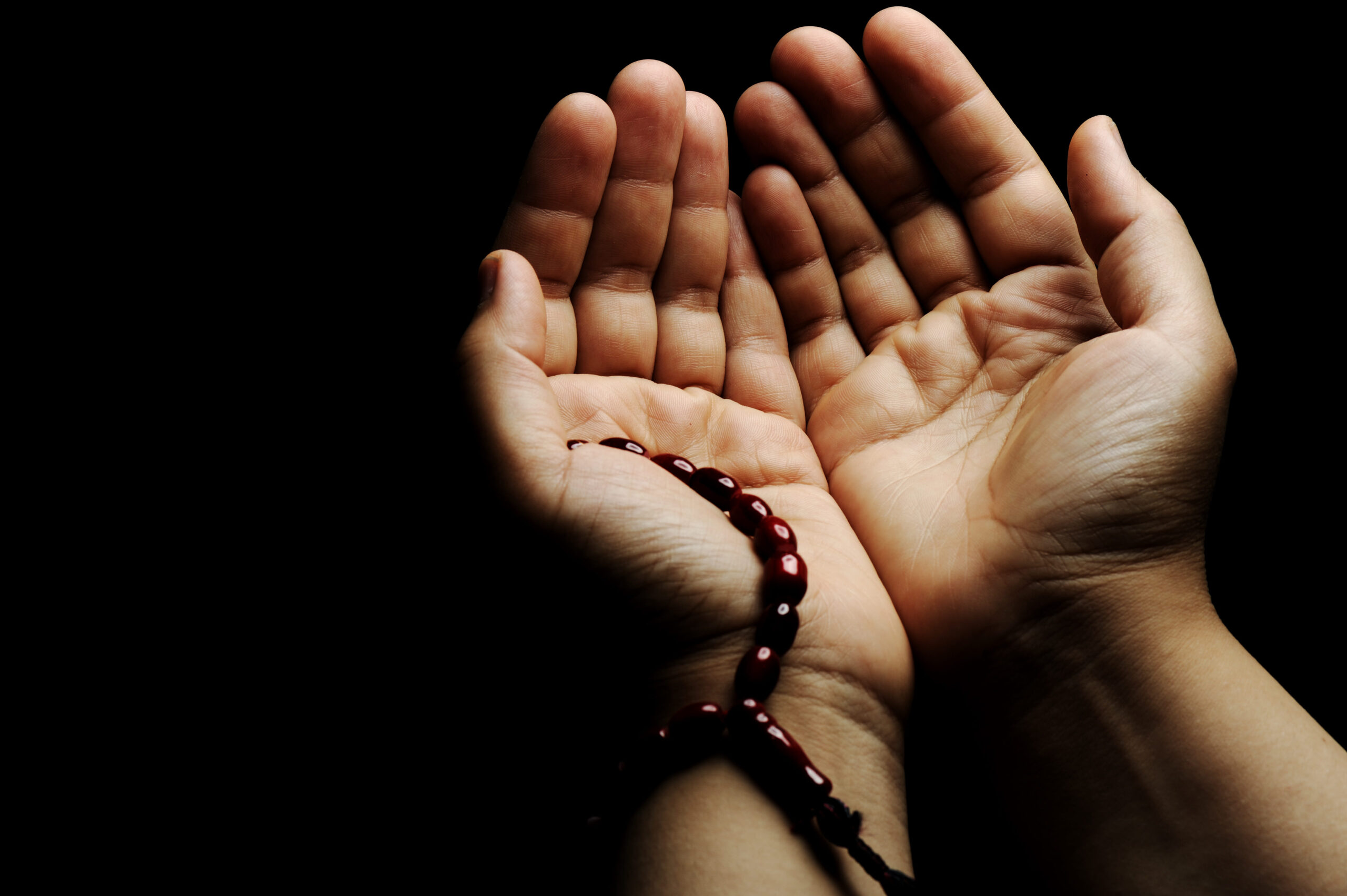Introduction
Muslim Dua Prayer (Supplication) to ALLAH (S.W.T.) is the best way to seek His help in times of urgency and extreme need. There are many supplications (Dua) for various important life needs mentioned in the Hadith, with direct references from the Qur’an. These supplications are provided because humans inevitably face difficult situations in life. At some point, we Muslims may encounter situations where good employment eludes us despite our efforts. There are times when, no matter how hard we work, we fail to achieve desired results.
It’s crucial for us to memorize and recite important supplications at their appropriate times, including Dua before and after eating meals, for wearing clothes, and for performing Wudu (Ablution). We Muslims are also mindful of the fact that ALLAH (S.W.T.) has warned us about Shaitan (Satan), our greatest enemy, who seeks to harm us at every turn. Whether in the marketplace or at home, Shaitan desires to create situations where our lives are endangered. To safeguard against his treacherous plots, various supplications have been narrated in Hadith.
Dua for entering the marketplace, entering and leaving the home, and protection from Shaitan are among those supplications passed down to us Muslims through authentic Hadith narrations. Thus, ALLAH (S.W.T.) has made every difficult situation easy for us by providing simple supplications (Dua) mentioned in the Qur’an and Hadith. This article explores various situations in human life and the corresponding supplications that should be recited to seek help from ALLAH (S.W.T.).
Muslim Dua Prayer for eating
In the extensive list of supplications or Muslim Dua Prayer, there exists one to express gratitude to Allah (S.W.T.) for providing us with sustenance, which enables human existence on this Earth. Food is among the blessings (Nim’ah) bestowed by Allah (S.W.T.), and every Muslim should express gratitude to Allah (S.W.T.) for the nourishing food they consume daily. When we look around the world, we witness millions of people who lack access to food. Additionally, there are millions more who, though they consume food, do not have access to good quality, flavorful meals. As Muslims fortunate enough to enjoy well-prepared, delicious food, we must express gratitude to Allah (S.W.T.) and thank Him for the abundant blessings He has bestowed upon us in the form of sustenance. The most authentic way to demonstrate gratitude to Allah (S.W.T.) is by reciting the Duas that have reached us through authentic Hadith narrations. The supplication for eating a meal consists of two parts: the Dua before eating and the Dua after finishing the meal. Both of these supplications, when recited, serve as authentic expressions of gratitude to Allah (S.W.T.). Moreover, reciting these Muslim Dua Prayer before and after eating brings immense blessings upon us. Here are the supplications (Duas) before and after eating a meal:
Muslim Dua Prayer before eating the meal
There are numerous Hadiths of Rasul Allah (S.A.W.) in which he instructed his companions to recite بِسْمِ اللَّهِ الرَّحْمَـٰنِ الرَّحِيمِ (Bismillah’Ir’Rahman’Ir’Rahim) before embarking on any good task, including partaking in a meal. However, specific supplications (Duas) are also mentioned in Sahih Hadith to be recited before beginning to eat. One such highly recommended supplication (Dua) to express gratitude and thankfulness to Allah (S.W.T.) for providing the amazing food, as per Sahih Hadith, is,
اللَّهُمَّ بَارِكْ لَنَا فِيهِ وَزِدْنَا مِنْهُ
Allahumma barik lana fihi wa arzuqna khairan minhu
O Allah, bless it for us and provide us with something better than it
- Sunan Ibn Majah (3322)
If, however, due to forgetfulness, one forgets to recite Bismillah before eating and remembers later that they have forgotten, there is a Hadith of Rasul Allah from Riyad As-Saliheen and several authentic Hadith books narrating the following Dua to compensate for the mistake.
بسم الله أوله وآخره
Bismillah awwalahu wa akhirahu
I begin with the Name of Allah at the beginning and at the end
- Riyad As Saliheen (728)
Muslim Dua Prayer after eating the meal
The following Muslim Dua Prayer after eating the meal is mentioned in various Sahih Hadith. When a Muslim finishes their meal, they should thank Allah and express gratitude by reciting the following Dua:
الْحَمْدُ لِلَّهِ الَّذِي أَطْعَمَنَا وَسَقَانَا وَجَعَلَنَا مُسْلِمِينَ
Al-hamdu lillahil-ladhi at’amana wa saqana wa ja’alana Muslimin
Praise is to Allah Who has fed us, given us to drink, and made us Muslims
- Sunan Ibn Majah (3283)
This is the most recited Muslim Dua Prayer and is recommended by a large majority of scholars. However, there are some other supplications (Duas) after finishing a meal mentioned in Sahih Hadith. Here are a few,
الْحَمْدُ لِلَّهِ الَّذِي أَطْعَمَنِي هَذَا الطَّعَامَ وَرَزَقَنِيهِ مِنْ غَيْرِ حَوْلٍ مِنِّي وَلاَ قُوَّةٍ
Al-hamdu lillahi-llazi at’amani haza, wa razaqaniihi min ghairi haulin minni wa la quwwah
Praise be to Allah Who has fed me with this food and provided me with it through no might and power on my part
- Sunan Abu Dawud (4023)
الْحَمْـدُ للهِ حَمْـداً كَثـيراً طَيِّـباً مُبـارَكاً فيه، غَيْرَ مَكْفِيٍّ وَلا مُوَدَّعٍ وَلا مُسْتَغْـنىً عَنْـهُ رَبَّـنا
Alhamdu lillāhi ḥamdan kathīran tayyiban mubārakan fīh, ghayra makfiyyin wa lā muwadda`in, wa lā mustaghnan `anhu Rabbanā.
All praise is to Allah, praise in abundance, good and blessed. It cannot [be compensated for, nor can it] be left, nor can it be done without, our Lord.
- Hisn al Muslim (181)
There are numerous Muslim Dua Prayers one may find in authentic Hadith narrations. As a Muslim, it’s important to memorize a supplication that is easy for them to remember. A single Muslim Dua Prayer is sufficient to express gratitude to Allah (S.W.T.) for providing us with delicious and high-quality food, which in itself is a blessing (Nim’ah).
Muslim Dua Prayer for weating clothes
It’s always a wonderful feeling to wear new clothes, a moment of gratitude towards Allah (S.W.T.). It’s because of His grace that we have the opportunity to wear nice clothes. Many people around the globe are unable to afford good clothing, some spending months with only a single garment. Whether we’re wearing new or old clothes, we should thank Allah (S.W.T.) and be grateful for providing us with something to cover our bodies.
Here are some supplications Muslim Dua Prayer that one should recite while dressing. These supplications are from Sahih Hadith, and the reciter receives immense rewards from Allah (S.W.T.).
اللَّهُمَّ لَكَ الْحَمْدُ أَنْتَ كَسَوْتَنِيهِ أَسْأَلُكَ مِنْ خَيْرِهِ وَخَيْرِ مَا صُنِعَ لَهُ وَأَعُوذُ بِكَ مِنْ شَرِّهِ وَشَرِّ مَا صُنِعَ لَهُ
Allaahumma lakal-hamdu ‘Anta kasawtaneehi, ‘as’aluka min khayrihi wa khayri maa suni’a lahu, wa ‘a’oothu bika min sharrihi wa sharri ma suni’a lahu
O Allah, praise be to Thee! as Thou hast clothed me with it, I ask Thee for its good and the good of that for which it was made, and I seek refuge in Thee from its evil and the evil of that for which it was made
- Sunan Abu Dawud (4020)
The above Dua is from a Hadith of Rasul Allah (S.A.W.), narrated by Abu Sa’id Al Khudri. According to the Hadith, the Messenger of Allah (S.A.W.) used to recite the above Muslim Dua Prayer whenever he wore a new garment.
الْحَمْدُ لِلَّهِ الَّذِي كَسَانِي هَذَا الثَّوْبَ وَرَزَقَنِيهِ مِنْ غَيْرِ حَوْلٍ مِنِّي وَلاَ قُوَّةٍ
Alhamdu lillahi al-ladhi kasani hadha ath-thawba wa razaqanihi min ghayri hawlin minni wa la quwwah
Praise be to Allah Who has clothed me with this and provided me with it through no might and power on my part
- Sunan Abu Dawud (4023)
This Muslim Dua Prayer is mentioned in Sunan Abu Dawud, Sahih Muslim, Sahih Bukhari, and other authentic books of Hadith. This Hadith comes from an authentic chain of narrations, and the reciter of this Dua is rewarded in both this life and the Hereafter. By reciting this Dua, one’s sins are forgiven by Allah (S.W.T.), and Allah (S.W.T.) increases the provision (rizq) as well.
Muslim Dua Prayer when entering the home
As discussed, Satan is our avowed enemy, prowling like a roaring lion in search of prey. He seeks to harm humans physically, mentally, emotionally, and economically. Therefore, we must continually seek protection from Allah (S.W.T.), repenting and asking for His forgiveness. The Prophet of Allah (S.A.W.) taught his companions (Sahaba) various ways to protect themselves from the harm inflicted by Satan. He also taught supplications that, when recited, safeguard individuals from the various plots Satan devises.
When entering our homes, it’s crucial to ensure that Satan does not enter with us or cause harm to us and our families. Here is a Muslim Dua Prayer that one must recite before greeting their family upon entering the home;
اللَّهُمَّ إِنِّي أَسْأَلُكَ خَيْرَ الْمَوْلِجِ وَخَيْرَ الْمَخْرَجِ بِسْمِ اللَّهِ وَلَجْنَا وَبِسْمِ اللَّهِ خَرَجْنَا وَعَلَى اللَّهِ رَبِّنَا تَوَكَّلْنَا
Allahumma inni as’aluka khayra al-mawliji wa khayra al-makhraji, bismillahi walajna wa bismillahi kharajna, wa ‘ala Allahi rabbina tawakkalna.
O Allah! I ask Thee for good both when entering and when going out; in the name of Allah we have entered, and in the name of Allah we have gone out, and in Allah our Lord do we trust
- Sunan Abu Dawud (5096)
According to various books of Sahih Hadith, it is mentioned that when entering one’s home, reciting “Bismillah” is advised. Additionally, one can recite the dua specifically for entering the home. However, if one forgets the dua, simply reciting “Bismillah” before entering the house is also recommended to stay protected from the evils of Satan and to receive the blessings of Allah over the home.
Muslim Dua Prayer for leaving the home
Whether we are inside our home, spending time with our family, or outside for work or other important matters, we need the blessing and help of Allah (S.W.T.). We require continuous guidance, support, and protection from Allah (S.W.T.) against the evil plots of Satan. As Muslims, it’s essential to remember Allah (S.W.T.) and seek His continuous guidance and support even when leaving the house for various purposes.
The best Muslim Dua Prayer for leaving home is Ayat al-Kursi from Surah Al-Imran of the Quran. When one recites Ayat al-Kursi once and leaves the house, Allah (S.W.T.) sends an angel to protect the person from every evil, and guidance from Allah (S.W.T.) accompanies the individual. If the person recites Ayat al-Kursi two times, then two angels safeguard the individual from every calamity. By reciting Ayat al-Kursi three times and blowing it over oneself, Allah Himself protects the individual from every calamity and the attacks of Satan. This protective effect of Ayat al-Kursi is mentioned in various Sahih Hadiths.
Apart from Ayat al-Kursi, one can also recite the following dua narrated by Anas (R.A.), mentioned in Jami at-Tirmidhi, Sunan Abu Dawud, Mishkat al-Masabih, Sunan Ibn Majah, Sahih Muslim, and Sahih Bukhari. According to the hadith narrated by Anas (R.A.), the reciter of this Muslim Dua Prayer is protected from every calamity inflicted by Satan, and Satan will become distant from him.
سْمِ اللَّهِ تَوَكَّلْتُ عَلَى اللَّهِ لَا حَوْلَ وَلَا قُوَّةَ إِلَّا بِاللَّهِ
Bismillahi tawakkaltu ‘ala Allahi, la hawla wa la quwwata illa billah.
In the name of God; I trust in God; there is no might and no power but in God
- Mishkat al Masabih (2443)
- Sunan Abu Dawud (5095)
- Jami at Tirmidhi (3426)
Muslim Dua Prayer when entering the marketplace
According to various Sahih (authentic) narrations, Shaitan (Satan) mostly preys on individuals in the open marketplace. In these spaces, one may encounter women without proper veiling (Hijab), witness conflicts between people, and encounter various tribulations (Fitnah) that can harm individuals. Therefore, it is incumbent upon a Muslim to carry a weapon to combat these tribulations when entering the marketplace. This weapon is the Dua mentioned in various Sahih Hadith books. The Dua, when entering the marketplace, ensures continuous protection from the evil schemes of Shaitan and his tribulations. The reciter of this Dua will receive continuous protection, support, and guidance from Allah (S.W.T.) and His angels, and no devil or natural calamity can harm them. Additionally, as Muslims, it is our responsibility to earn rewards through good deeds that will be beneficial for us in the Hereafter. Thus, we require a Dua that could grant us the rewards of reciting it and forgive us for all past sins resulting from mistakes or negligence and Here is that Dua;
لاَ إِلَهَ إِلاَّ اللَّهُ وَحْدَهُ لاَ شَرِيكَ لَهُ لَهُ الْمُلْكُ وَلَهُ الْحَمْدُ يُحْيِي وَيُمِيتُ وَهُوَ حَىٌّ لاَ يَمُوتُ بِيَدِهِ الْخَيْرُ كُلُّهُ وَهُوَ عَلَى كُلِّ شَىْءٍ قَدِيرٌ
La ilaha illallah wahdahu la sharika lahu, lahul-mulk wa lahul-hamdu, yuhyi wa yumitu, wa Huwa hayyun la yamutu, bi yadihil-khairu kulluhu, wa Huwa ala kulli shay’in Qadir
None has the right to be worshiped but Allah alone, with no partner, to Him belongs all sovereignty and to Him is the praise, He gives life and gives death, and He is Ever-Living and does not die; in His Hand is all goodness and He is Able to do all things
- Sunan Ibn Majah (2235)
The aforementioned Dua is derived from Sahih Hadith, found in Sahih Bukhari, Sahih Muslim, Sunan Ibn Majah, and other Hadith collections. Narrated by Salim bin ‘Abdullah ibn Umar, it is reported that the Prophet Muhammad (S.A.W.) stated that reciting this Dua upon entering a marketplace earns the believer one million good deeds, erases one million bad deeds, and secures a place for them in Paradise.
For those facing difficulty memorizing this Dua, it can be learned in parts, allowing time for memorization. An excellent alternative to this Dua is Ayat al Kursi from Surah Al-Imran (Chapter 3) of the Qur’an. As discussed earlier, Ayat al Kursi serves as a protective shield against the assaults of Satan.
Muslim Dua Prayer for fasting
Fasting (Sawm) holds a cherished place in the eyes of Allah (S.W.T.) for a Muslim. Through fasting, Allah elevates one’s spirituality and fosters Taqwa. Furthermore, observing fasts draws an individual closer to Allah (S.W.T.), elevating their rank (Martaba) in His court. The significance of fasting is elucidated in a Hadith where Allah (S.W.T.) expresses love for the breath of the fasting person throughout the day, valuing it more than the fragrance of Musk. Moreover, the rewards for fasting in the month of Ramadan are multiplied seventyfold compared to other months. This underscores the importance of fasting in Islam.
To begin fasting, it is crucial to make an intention (Niyah), which is accomplished by reciting a specific Dua. There are two distinct supplications for fasting: one for initiating the fast after Suhr (pre-dawn meal), and another for breaking the fast. Below are the respective supplications for making the intention for fasting and for breaking the fast.
Muslim Dua Prayer for making intention (niyah) to fast
When finished eating during Suhr, the believer intending to fast must recite the following Dua,
وَبِصَوْمِ غَدٍ نَّوَيْتُ مِنْ شَهْرِ رَمَضَانَ
Wa bisawmi ghadinn nawaiytu min shahri Ramadan
I intend to keep the fast for tomorrow in the month of Ramadan
Muslim Dua Prayer for breaking the fast
A believer breaks their fast when the time of Maghrib begins, i.e., when the sun has completely set. A believer must hasten to break the fast and should not delay it. Before breaking the fast, a believer must recite the following Dua;
اللَّهُمَّ لَكَ صُمْتُ وَعَلَى رِزْقِكَ أَفْطَرْتُ
Allahumma laka ṣumtu wa ‘ala rizqika aftartu
O Allah, for Thee I have fasted, and with Thy provision I have broken my fast.
- Sunan Abu Dawud (2358)
Muslim Dua Prayer for job interview
We all need employment to survive in this Dunya. This world itself is a test for all believers. For a believer, it is crucial to live their life under the umbrella of Shari’ah. A good, Halal job thus becomes necessary in these times of intense tribulations (Fitnah), where preserving one’s Iman has become a challenging task. Therefore, a person must continuously seek repentance from Allah (S.W.T.) and ask for His help. When a believer gets the opportunity to appear in a job interview, the first and foremost consideration should be whether the job they have applied for aligns with the principles of Shari’ah. If it does, then the individual must have full faith in Allah (S.W.T.) and seek His help. They should make Dua before appearing for the job interview. Although Dua does not necessarily mean using already prescribed words mentioned in Hadith, an individual can also make Dua and pour out their heart to Allah (S.W.T.) in their own language with full faith. The reason Arabic Dua is highly effective is because the Qur’an was revealed in Arabic, and our last Prophet’s tongue was Arabic. Therefore, he gave us every Dua in Arabic, and whatever Dua comes from our beloved Prophet is directly from the Arsh (the Highest of the Heavens). This is the reason why the supplications (Dua) coming from the mouth of Rasul Allah through authentic Hadith are very effective. However, there are no specific supplications (Dua) related to clearing a job interview mentioned in specific Hadith. Nonetheless, many scholars of Islam and many Wali Allah (saints of Allah) have prescribed a few important supplications to be recited to emerge successful in a job interview. Here are a few Muslim Dua Prayer that one can recite before appearing for the job interview.
اللَّهُمَّ إِنِّي أَسْأَلُكَ عِلْمًا نَافِعًا، وَرِزْقًا طَيِّبًا، وَعَمَلاً مُتَقَبَّلاً
Allahumma inni as’aluka ‘ilman nafi’an, wa rizqan tayyiban, wa ‘amalan mutaqabbalan
O Allah, I ask You for beneficial knowledge, goodly provision and acceptable deeds
- Sunan Ibn Majah (925)
Those seeking success in their job interviews should recite this prayer on the day of the interview before Fajr prayer. In Sha Allah, the believer appearing for the job interview will emerge successful.
According to many Islamic scholars, reciting verses 25-28 from Surah Taha (Chapter 20) of the Qur’an before a job interview helps in clearing the interview. Here are the verses,
قَالَ رَبِّ ٱشۡرَحۡ لِى صَدۡرِى
وَيَسِّرۡ لِىٓ أَمۡرِى
وَٱحۡلُلۡ عُقۡدَةً۬ مِّن لِّسَانِى
يَفۡقَهُواْ قَوۡلِىٓ
Qala rabbi ishrah li sadri
Wayassir li amri
Wah-lul uqdatan min lisaani
Yafqahu qawli
- Al Qur’an (Ch20, v25-28)
One must always remember that their Rizq (sustenance) is already predetermined. Therefore, a believer should not fear any kind of failure before a job interview. Instead, they should have full faith in Allah (S.W.T.), believing that their sustenance is already ordained, and Allah (S.W.T.) will sustain them until their last breath, just as parents care for their children.
Muslim Dua Prayer for Wudu
Wudu, in itself, is a form of worship. When one intends to perform Wudu and begins the process, all their previous minor sins (Gunah Saghira) begin to be washed away with the water. Therefore, for making Wudu, a believer must be aware of a few important things: they must make a proper intention for Wudu by reciting a Dua, they must have access to clean water, all the obligatory acts (Fardh) in Wudu must be performed correctly, and finally, they should conclude the Wudu with the recitation of a proper Dua to seek Allah’s blessings.
Muslim Dua Prayer before beginning the Wudu
بِسْمِ اللَّهِ الْعَظِيمِ، وَالْحَمْدُ لِلَّهِ عَلَى الدِّينِ الإِسْلاَمِ
Bismillahil Azeemi Wal Hamdu Lillahi Ala Deenil Islam
“In the name of Allah, the Magnificent, and praise be to Allah upon the religion of Islam.”
This supplication is mentioned in Hadith. Although there isn’t a specific hadith mentioning this exact phrasing for the dua before Wudu, the Prophet Muhammad (peace be upon him) frequently invoked the name of Allah and praised Him before performing any act of worship. The spirit of this supplication is consistent with the teachings of Islam, which emphasize beginning every task or ritual with the name of Allah and expressing gratitude for being guided to the religion of Islam.
Muslim Dua Prayer after completing the Wudu
أَشْهَدُ أَنْ لا إِلَهَ إِلَّا اللَّهُ وَحْدَهُ لا شَرِيكَ لَهُ، وَأَشْهَدُ أَنَّ مُحَمَّدًا عَبْدُهُ وَرَسُولُهُ
اللّهُـمَّ اجْعَلنـي مِنَ التَّـوّابينَ وَاجْعَـلْني مِنَ المتَطَهّـرين
Ashhadu an la ilaha illa Allah, wahdahu la sharika lah, wa ashhadu anna Muhammadan ‘abduhu wa rasuluh
Allahumma-j’alni minat-tawwabina waj’alni minal-mutatahhirin
I bear witness that there is no god but Allah, alone, without any partner, and I bear witness that Muhammad is His servant and Messenger
O Allah, make me among those who turn to You in repentance, and make me among those who are purified
- Riyad As-Saliheen (1032)
Conclusion
Muslim Dua Prayer for every important daily act have been mentioned above. These are essential activities from which believers cannot imagine detaching themselves. We have been provided with these supplications due to Allah’s intense love for believers. He desires for believers to live like kings on this planet without enduring tribulations or suffering from any problems. Although there are many supplications for every act a believer performs, it can be challenging to memorize them all at once. A believer should start with some basic Duas and then progress to more advanced ones. For tasks for which a believer does not have a memorized Dua, they can begin with “Bismillah’Ir’Rahman’ir’Rahim,” as evidenced by many Sahih Hadiths, and end the task with “Alhamdulillah.”
Muslim Dua Prayer that have come to us through a proper chain of narrations from the Sahaba are a great way to invoke Allah’s blessings and guidance in these times of intense Fitnah (trials). May Allah help us memorize all the important supplications with ease, and may He make our lives easier!




